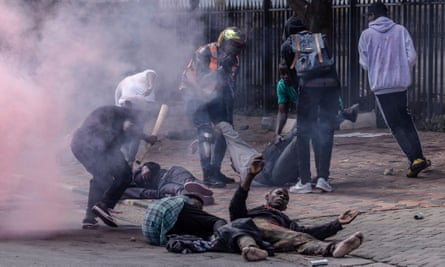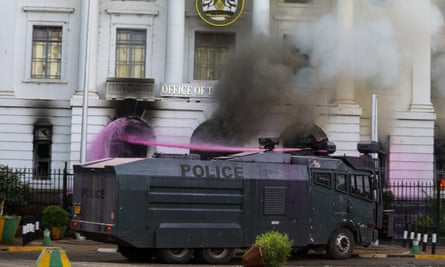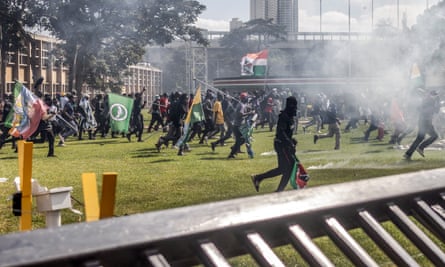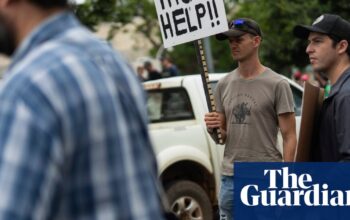Police have opened fire on protesters outside the Kenyan parliament as they attempted to storm the building in Nairobi while MPs inside passed legislation to raise taxes.
At least five people were shot dead, according to Reuters, amid chaotic scenes in which police started shooting after teargas and water cannon failed to disperse a crowd of thousands who had overwhelmed officers. Flames could be seen coming from inside the building.

A paramedic said at least 10 people had died and a Reuters journalist outside the parliament counted the bodies of at least five protesters.
“We want to shut down parliament and every MP should go down and resign,” one protester, Davis Tafari, told the news agency. “We will have a new government.”
The demonstrators oppose tax rises in a country reeling from a cost of living crisis, and many are also calling for President William Ruto to step down.
“We wake up every day to go and hustle, but you can’t even buy anything these days because life has become so expensive,” said Daniel Mwangi, a 32-year-old informal worker, as he weaved his way through the crowd on the streets clouded pink from water cannon spray.
“We don’t have work so we can be here [protesting] every day. If we can’t find something to live for, we will find something to die for.”
Auma Obama, an activist and the half-sister of the former US president Barack Obama, was among the protesters teargassed, a CNN interview showed.

Protests and clashes started a week ago and also took place in other cities and towns across the country.
Last Thursday, one person was killed and at least 200 people were injured in demonstrations across the country, according to human rights groups and the Independent Policing Oversight Authority, a police watchdog.
The protests have been driven largely by youth-led digital activism. Young Kenyans have used platforms such as X and TikTok to oppose the bill, crowdfund, organise and mobilise protests against it.
At least 12 people suspected of involvement in the protests over the past five days had been abducted, according to Amnesty International.

On Tuesday the Kenyan broadcaster KTN reported it had received threats from authorities to shut down the station due to its coverage of the protests.
The internet watchdog NetBlocks on Tuesday reported a “major disruption” to internet connectivity in the country during the demonstrations. A day earlier the Communications Authority of Kenya, a regulatory agency, denied plans to shut down the internet or interfere with the quality of connectivity.
Ruto won an election almost two years ago on a platform of championing Kenya’s working poor, but has been caught between the competing demands of lenders, such as the International Monetary Fund, which is urging the government to cut deficits in order to access more funding, and a hard-pressed population.
On Tuesday night Kenya’s defence minister, Aden Duale, announced the deployment of the military to support police, “in response to the security emergency caused by the ongoing violent protests”.
In a press briefing, Ruto described the day’s events as “treasonous”. He blamed the violence on “criminals”, adding: “We must isolate crime from democratic expression.”
“Today’s events mark a critical turning point on how we respond to grave threats to our national security,” he said. “The government has mobilised all resources at the nation’s disposal to ensure that a situation of this nature will not recur again, at whatever cost.”
Kenyans have been struggling to cope with several economic shocks caused by the lingering impact of the Covid pandemic, the war in Ukraine, two consecutive years of droughts and depreciation of the currency.
Parliament approved the finance bill on Tuesday, moving it through to a third reading by lawmakers. The next step is for the legislation to be sent to the president for signing. He can send it back to parliament if he has any objections.
The finance bill aims to raise an additional $2.7bn in taxes as part of an effort to lighten the debt load, with interest payments alone consuming 37% of annual revenue.
The government has already made some concessions, promising to scrap proposed new taxes on bread, cooking oil, car ownership and financial transactions. But that has not been enough to satisfy protesters.
“We cannot be taxed on every small thing,” said Alex Wachira, a 34-year-old IT worker, as he sheltered from a fresh round of teargas. “We are being overtaxed and not seeing anything come out of it, yet we see our leaders [living large].”
Source: theguardian.com


